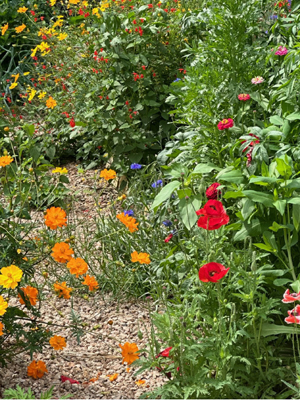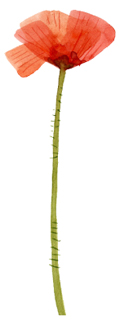Posted on Jul 4, 2023 in
LIVING THE SWEET LIFE

By Alisa Murray www.AlisaMurray.com Nationally recognized portrait artist and award-winning columnist.
Hey Sweet Lifers! I hope all of y’all are having a wonderful start to summer. I have been enjoying mine most thoroughly. I’ve been learning a lot about what seeds to sow and when to do so in the flower garden.
Watching things sprout up and grow has been quite satisfying. The poppy has been one such flower that I have tried and failed, and finally, this year has decided to grace my presence with its beauty. It’s really amazing how much can be learned from actually reading the instructions! These gals have to be sowed in the fall in order to come our showy in spring.
I remember when the children, now all adults, saw the packages of seeds, and every one of them gave me a look. I had not thought much about the history of the poppy, or even its use, for that matter. My own childhood memories were faint recollections of the film The Wonderful Wizard of Oz with its sea of red beauties. It did not take me long to get all informed by the children as you can quite imagine. “Why are you growing those, Mother?” “What are you going to do with those?” Ah… “Have them in the garden to enjoy, and watch the butterflies and bees.” I replied. And then I looked up the poppy. What a history this flower has had!
 The poppy is one of the most famous plants in medicine for its pain killing properties. Obviously, I am assuming you already knew – codeine and morphine. Lord have mercy! Of course, I did not because I don’t fly on that radar. This plant has been found native all over the world with the Sumerians growing it as early as 3,400 B.C. It was at the center of the opium wars in the early 1800s! It has an interesting history from World War I as well with the fallen soldiers in Flanders, France. Apparently after the men were buried, massive amounts of poppies began to sprout over the graves in the newly sifted soils inspiring literary poets to write about the poppy and one most famous poems entitled In Flanders Field written by a Canadian solider in 1915. That means my grandmothers would have known about this flower, and like so many things in the garden and kitchen, too, I miss not having their wisdom and insight. I would have known a lot more about these tiny seeds had they been here to tell me.
The poppy is one of the most famous plants in medicine for its pain killing properties. Obviously, I am assuming you already knew – codeine and morphine. Lord have mercy! Of course, I did not because I don’t fly on that radar. This plant has been found native all over the world with the Sumerians growing it as early as 3,400 B.C. It was at the center of the opium wars in the early 1800s! It has an interesting history from World War I as well with the fallen soldiers in Flanders, France. Apparently after the men were buried, massive amounts of poppies began to sprout over the graves in the newly sifted soils inspiring literary poets to write about the poppy and one most famous poems entitled In Flanders Field written by a Canadian solider in 1915. That means my grandmothers would have known about this flower, and like so many things in the garden and kitchen, too, I miss not having their wisdom and insight. I would have known a lot more about these tiny seeds had they been here to tell me.
 There are several poppies that came up in the wildlife habitat for the first time this year, and they are so delicate and wispy. I have spent a lot of time photographing them and watching how they form and open up. So many friends these days pop over to walk and pick the garden, and almost always they comment how much peace they feel here. I found it interesting that the poppy actually symbolizes peace, remembrance, undying love and sacrifice – all words that describe my sentiments in my Sweet Life Garden. More often than not, it’s in my own sea of flowers mixed with Queen Anne’s Lace that I find myself remembering my summer mountain hikes with my grandfather. The heavy scent of hyacinths bring me to the side of my childhood home where mother planted them before she died. The hydrangeas with their splashes of changing pinks to blues to lavenders remind me of my Nana and all those vegetables. And, when my fingers are stained green from picking tomatoes and cucumbers, I’m right there with my Daddy!
There are several poppies that came up in the wildlife habitat for the first time this year, and they are so delicate and wispy. I have spent a lot of time photographing them and watching how they form and open up. So many friends these days pop over to walk and pick the garden, and almost always they comment how much peace they feel here. I found it interesting that the poppy actually symbolizes peace, remembrance, undying love and sacrifice – all words that describe my sentiments in my Sweet Life Garden. More often than not, it’s in my own sea of flowers mixed with Queen Anne’s Lace that I find myself remembering my summer mountain hikes with my grandfather. The heavy scent of hyacinths bring me to the side of my childhood home where mother planted them before she died. The hydrangeas with their splashes of changing pinks to blues to lavenders remind me of my Nana and all those vegetables. And, when my fingers are stained green from picking tomatoes and cucumbers, I’m right there with my Daddy!
There’s a lot of sacrifice when planting a garden, and mine has taught me so many things about patience and remembrance. Mostly though, it has been and will continue to provide a place of solitude and a portal that brings forth floods of past memories of my family no longer here with me. I think that what people feel in it is the same sense of mortality and grace. Each day it is different as we, each day, are as well. Everything blooms in its own time and place and succumbing to an ever-changing life with all its ups and downs makes you stop and enjoy every moment. It’s in the understanding of that one can truly live a sweet life, and a sweet life is one of peace!
Take care of you and stay “sweet!”
Alisa



 <
<






 The poppy is one of the most famous plants in medicine for its pain killing properties. Obviously, I am assuming you already knew – codeine and morphine. Lord have mercy! Of course, I did not because I don’t fly on that radar. This plant has been found native all over the world with the Sumerians growing it as early as 3,400 B.C. It was at the center of the opium wars in the early 1800s! It has an interesting history from World War I as well with the fallen soldiers in Flanders, France. Apparently after the men were buried, massive amounts of poppies began to sprout over the graves in the newly sifted soils inspiring literary poets to write about the poppy and one most famous poems entitled In Flanders Field written by a Canadian solider in 1915. That means my grandmothers would have known about this flower, and like so many things in the garden and kitchen, too, I miss not having their wisdom and insight. I would have known a lot more about these tiny seeds had they been here to tell me.
The poppy is one of the most famous plants in medicine for its pain killing properties. Obviously, I am assuming you already knew – codeine and morphine. Lord have mercy! Of course, I did not because I don’t fly on that radar. This plant has been found native all over the world with the Sumerians growing it as early as 3,400 B.C. It was at the center of the opium wars in the early 1800s! It has an interesting history from World War I as well with the fallen soldiers in Flanders, France. Apparently after the men were buried, massive amounts of poppies began to sprout over the graves in the newly sifted soils inspiring literary poets to write about the poppy and one most famous poems entitled In Flanders Field written by a Canadian solider in 1915. That means my grandmothers would have known about this flower, and like so many things in the garden and kitchen, too, I miss not having their wisdom and insight. I would have known a lot more about these tiny seeds had they been here to tell me. There are several poppies that came up in the wildlife habitat for the first time this year, and they are so delicate and wispy. I have spent a lot of time photographing them and watching how they form and open up. So many friends these days pop over to walk and pick the garden, and almost always they comment how much peace they feel here. I found it interesting that the poppy actually symbolizes peace, remembrance, undying love and sacrifice – all words that describe my sentiments in my Sweet Life Garden. More often than not, it’s in my own sea of flowers mixed with Queen Anne’s Lace that I find myself remembering my summer mountain hikes with my grandfather. The heavy scent of hyacinths bring me to the side of my childhood home where mother planted them before she died. The hydrangeas with their splashes of changing pinks to blues to lavenders remind me of my Nana and all those vegetables.
There are several poppies that came up in the wildlife habitat for the first time this year, and they are so delicate and wispy. I have spent a lot of time photographing them and watching how they form and open up. So many friends these days pop over to walk and pick the garden, and almost always they comment how much peace they feel here. I found it interesting that the poppy actually symbolizes peace, remembrance, undying love and sacrifice – all words that describe my sentiments in my Sweet Life Garden. More often than not, it’s in my own sea of flowers mixed with Queen Anne’s Lace that I find myself remembering my summer mountain hikes with my grandfather. The heavy scent of hyacinths bring me to the side of my childhood home where mother planted them before she died. The hydrangeas with their splashes of changing pinks to blues to lavenders remind me of my Nana and all those vegetables.